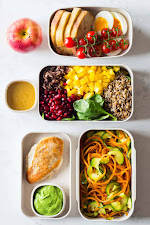One reason chronic dieting slows down your metabolism is that extreme dieting feels like starvation to your body. Starvation stresses the adrenal glands, which in turn induce a string of chemical reactions in your body that suppress normal production of the thyroid hormones that promote fat burning (T3), in favour of more production of a different thyroid hormone that encourages fat storage (reverse T3, or RT3).
This is an oversimplification, but in essence, this fat-storage hormone, RT3, blocks the hormone receptor sites throughout your body, especially in your belly, thighs, and butt, like a goalie defending a goal against the ball. The fat-burning hormone (T3) can’t get in there and burn that fat for fuel.
RT3 is a necessary hormone. Without it, we would all have to eat every two hours or we would die. This hormone gets secreted to tell your body not to burn those 500 calories from breakfast or dinner too quickly. It tells your body: “Careful, that might be all you’re going to get,” or “Don’t burn o? that whole dinner, you might not get anything else to sustain you until 2:00 P.M. tomorrow!” It’s as if someone told you that you had 4 cups of rice and 2 cups of beans to live on for the next month.
You’d be darn sure to ration that food so you could survive. You wouldn’t want to eat it all the first day. That’s what RT3 “sees” when you get too stressed and you don’t eat enough: 4 cups of rice and 2 cups of beans. When your body produces too much RT3, it begins to store fat instead of burn it, even when you have plenty of fat already on-board. As I said above, RT3 acts like a goalie in front of the T3 receptor sites, blocking the ball (T3).
Your brain, however, detects the presence of plenty of thyroid hormones, no matter what kind are circulating, so it steps down thyroid hormone production across the board. Your metabolism slows down in response, and then you begin to store everything you eat as fat, even healthful foods. The only way to reverse this process is to jump-start your metabolism again, and the best way to get started is to ditch old, mistaken beliefs about food that are literally weighing you down.
First, let’s knock down some of the metabolic myths that are standing in your way, then in the next chapter we’ll discuss the five major weight-loss players that we’ll fine-tune with the Fast Metabolism Diet before we get to the yummy stuff … the food!
RELATED POSTS
Metabolism! How Did We Get Here
Metabolic Myth #1: If I Could Just Eat Less, I’d Finally Lose
Weight
Metabolic Myth #2: If I Like It Too Much, It Can’t Be Good For
Me … Or My Waistline
Metabolic Myth #3: Losing Weight Is Simply Calories In, Calories
Out
Metabolic Myth #4: Desserts Make You Fat
Metabolic Truth #1: To Lose Weight You Must Make Peace with Food
Metabolic Truth #2: Food Is Something That Was Once Alive and
Came From the Land, Sky, or Sea
The Body Five Major Players—and Why
They Are Essential To Metabolic Repair
Around the Web


































